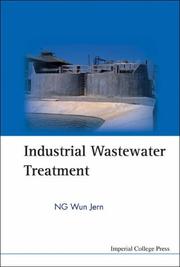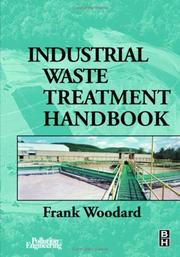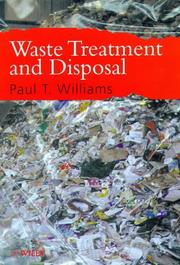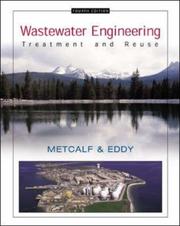| Listing 1 - 10 of 10 |
Sort by
|

ISBN: 186094664X 1860945805 Year: 2006 Publisher: London : Hackensack, NJ : Imperial College Press ; Distributed by World Scientific Pub. Co.,
Abstract | Keywords | Export | Availability | Bookmark
 Loading...
Loading...Choose an application
- Reference Manager
- EndNote
- RefWorks (Direct export to RefWorks)
Factory and trade waste --- Sewage disposal plants --- Sewage --- Afvalwaterbehandeling --- Purification --- Afvalwaterbehandeling.
Book
ISBN: 9789090264974 Year: 2011 Publisher: Zwijnaarde Universiteit Gent. Vakgroep Industrieel Beheer
Abstract | Keywords | Export | Availability | Bookmark
 Loading...
Loading...Choose an application
- Reference Manager
- EndNote
- RefWorks (Direct export to RefWorks)
Het boek 'De Fabriek van de Toekomst nu! - Duurzame productiviteitsverbetering voor kmo's' handelt vooral over de eerste en moeilijkste fase van de weg naar innovatie: de IK fase (zie ook: de weg naar innovatie). Dit boek richt zich in de eerste plaats tot de kleinere industriële bedrijven, de kmo's. Zij zijn heel belangrijk voor de Vlaamse economie als motor van de innovatie. Maar als doelgroep zijn ze ook heel moeilijk te bereiken: vooreerst hebben ze vaak geen tijd om zich bezig te houden met innovatie en strategie omwille van een hectische werkomgeving die weinig gestructureerd is ze hebben beperkte of helemaal geen expertise in methodes om de productiviteit te verbeteren ze beschikken over weinig fondsen om hiervoor externe kennis in te kopen Het resultaat is eigenlijk schokkend: men laat geld liggen terwijl de winstgevendheid onder druk staat. Punctuele acties en korte interventies hebben evenmin veel effect. De hamvraag is dus hoe bedrijven (en kmo's in het bijzonder) duurzame verbeteringen kunnen realiseren die leiden naar innovatie? Om een antwoord te bieden op deze vraag, werd de ERIP methode ontwikkeld en uitgetest. Leren al doende is hier het motto! Vier kmo's in Vlaanderen, en 24 kmo's in West-Europa, gingen u voor. Hun ervaringen en successen illustreren elk facet van de succesvolle methode. Dit boekje is zodanig geschreven zodat het een handig leidraad biedt bij het introduceren van continu verbeteren in uw bedrijf. .
Fabrieken --- Fabriques --- Factories --- Factory buildings --- Industriegebouwen --- Manufactures (Usines) --- Mills (Building) --- Plants [Industrial ] --- Usines --- Werkplaatsen --- duurzame productiviteitsverbetering --- ERIP --- kmo --- Small business --- Belgium --- Management --- Handbooks, manuals, etc. --- Europe

ISBN: 0750673176 Year: 2001 Publisher: Boston : Butterworth-Heinemann,
Abstract | Keywords | Export | Availability | Bookmark
 Loading...
Loading...Choose an application
- Reference Manager
- EndNote
- RefWorks (Direct export to RefWorks)
Samenvatting:All industries produce waste products that unless treated or mitigated insome way will be harmful to the human or natural environment. These wasteproducts will generally need to be identified according to the industrialprocess in question, neutralized or rendered less harmful and finallydisposed of into the surrounding land, air or watercourses. It istherefore of vital importance to every environmental, pollution or plantmanager or engineer that these processes be fully understood andimplemented or the cost to either the company or the environment can becatastrophic.With increasing government regulation of pollution, as well aswillingness to levy punitive fines for transgressions, and theever-present financial imperative to carry out these activities in themost efficient and cost-effective manner it is the responsibility of theprofessionals in question to ensure that they have the most up-to-dateinformation available at their disposal. This book provides not onlythat, but the only available methodology for identifying which wastetypes are produced from which industrial processes, and how they can betreated. This unique feature makes this book one that everyenvironmental, industrial and plant manager, engineer and consultant willwant to have on their bookshelf.Essential aspect of, and requirement for, all manufacturing industryThe only up-to-date book on this subject area availableTakes a practical applications standpoint, not a theoretical approach
Agrotechnology and Food Sciences. Engineering --- Factory and trade waste --- Industries --- Pollution prevention. --- Sewage --- Waste treatment. --- Management --- Environmental aspects. --- Purification --- Afvalstoffenmanagement. --- Vuilverwerking.
Book
ISBN: 9781405175173 Year: 2011 Publisher: Chichester John Wiley & sons, Ltd
Abstract | Keywords | Export | Availability | Bookmark
 Loading...
Loading...Choose an application
- Reference Manager
- EndNote
- RefWorks (Direct export to RefWorks)
The collection, transportation and subsequent processing of waste materials is a vast field of study which incorporates technical, social, legal, economic, environmental and regulatory issues. Common waste management practices include landfilling, biological treatment, incineration, and recycling - all boasting advantages and disadvantages. Waste management has changed significantly over the past ten years, with an increased focus on integrated waste management and life-cycle assessment (LCA), with the aim of reducing the reliance on landfill with its obvious environmental concerns in favour of greener solutions. With contributions from more than seventy internationally known experts presented in two volumes and backed by the International Waste Working Group and the International Solid Waste Association, detailed chapters cover: Waste Generation and Characterization ; Life Cycle Assessment of Waste Management Systems ; Waste Minimization ; Material Recycling ; Waste Collection ; Mechanical Treatment and Separation ; Thermal Treatment ; Biological Treatment ; Landfilling ; Special and Hazardous Waste. Solid Waste Technology & Management is a balanced and detailed account of all aspects of municipal solid waste management, treatment and disposal, covering both engineering and management aspects with an overarching emphasis on the life-cycle approach. [Publisher]
Environmental protection. Environmental technology --- Refuse and refuse disposal --- Waste products --- Factory and trade waste --- Hazardous wastes --- Déchets --- Déchets industriels --- Déchets dangereux --- Heat treatment --- Élimination --- Traitement thermique --- Déchets dangereux. --- Élimination. --- Traitement thermique. --- Heat treatment. --- Déchets --- Déchets industriels --- Déchets dangereux. --- Élimination.

ISBN: 0471981494 0471981664 Year: 1998 Publisher: Chichester : Wiley,
Abstract | Keywords | Export | Availability | Bookmark
 Loading...
Loading...Choose an application
- Reference Manager
- EndNote
- RefWorks (Direct export to RefWorks)
-Discarded materials --- Vuilverwerking --- Afvalstoffen. --- Beleid. --- Vuilverwerking. --- Groot-Brittannië. --- Refuse and refuse disposal --- Government policy --- Discarded materials --- Disposal of refuse --- Garbage --- Household waste --- Household wastes --- Rubbish --- Solid waste management --- Trash --- Waste disposal --- Waste management --- Wastes, Household --- Sanitation --- Factory and trade waste --- Pollution --- Pollution control industry --- Salvage (Waste, etc.) --- Street cleaning --- Waste products --- Environmental aspects
Book
ISBN: 0815507003 Year: 1978 Publisher: Park Ridge (N.J.) : Noyes data corporation,
Abstract | Keywords | Export | Availability | Bookmark
 Loading...
Loading...Choose an application
- Reference Manager
- EndNote
- RefWorks (Direct export to RefWorks)
Environmental protection. Environmental technology --- Industrial chemistry --- Hazardous wastes --- Organic compounds --- Toxins --- 615.9 --- Natural toxicants --- Toxicants, Natural --- Toxins and antitoxins --- Antigens --- Metabolites --- Poisons --- Antitoxins --- Detoxification (Health) --- Compounds, Organic --- Organic chemicals --- Carbon compounds --- Hazardous waste disposal --- Poisonous wastes --- Toxic waste disposal --- Toxic waste release --- Toxic wastes --- Waste disposal --- Wastes, Hazardous --- Factory and trade waste --- Hazardous substances --- Refuse and refuse disposal --- Pollution --- General toxicology. General studies of poisons and poisoning (intoxication) --- Hazardous wastes. --- Organic compounds. --- Toxins. --- Industriewaterzuivering --- Industriewaterzuivering. --- 615.9 General toxicology. General studies of poisons and poisoning (intoxication)

ISBN: 0071122508 0070418780 9780071122504 Year: 2003 Publisher: Boston (Mass.): McGraw-Hill,
Abstract | Keywords | Export | Availability | Bookmark
 Loading...
Loading...Choose an application
- Reference Manager
- EndNote
- RefWorks (Direct export to RefWorks)
Inhoudsopgave : 1 Wastewater Engineering: An Overview p.1 2 Constituents in Wastewater p.27 3 Analysis and Selection of Wastewater Flowrates and Constituent Loadingsp.153 4 Introduction to Process Analysis and Selection p.215 5 Physical Unit Operations p.311 6 Chemical Unit Processes p.475 7 Fundamentals of Biological Treatment p.545 8 Suspended Growth Biological Treatment Processes p.659 9 Attached Growth and Combined Biological Treatment Processes p.887 10 Anaerobic Suspended and Attached Growth Biological Treatment Processesp.983 11 Advanced Wastewater Treatment p.1035 12 Disinfection Processes p.1217 13 Water Reuse p.1345 14 Treatment, Reuse, and Disposal of Solids and Biosolids p.1447 15 Issues Related to Treatment-Plant Performance p.1633 App. A Conversion Factors p.1729 App. B Physical Properties of Selected Gases and the Composition of Airp.1737 App. C Physical Properties of Water p.1741 App. D Solubility of Dissolved Oxygen in Water as a Function of Salinityand Barometric Pressure p.1745 App. E MPN Tables and Their Use p.1749 App. F Carbonate Equilibrium p.1753 App. G Moody Diagrams for the Analysis of Flow in Pipes p.1757
sewage treatment --- afvalwaterzuivering --- Water supply. Water treatment. Water pollution --- riolering --- afvalwater --- Sewerage --- Sewage disposal --- Water reuse --- Egouts --- Eaux usées --- Eau --- Evacuation --- Réutilisation --- Sewerage. --- Water reuse. --- Sewage disposal. --- Afvalwaterzuivering --- Afvalwaterzuivering. --- hergebruik --- Eaux usées --- Réutilisation --- waterverontreiniging --- waterzuivering --- House drainage --- Sewers --- Drainage, House --- Hydraulic structures --- Municipal engineering --- Sanitary engineering --- Underground utility lines --- Drainage --- Plumbing --- Reclamation of water --- Reuse of water --- Waste water reclamation --- Wastewater reclamation --- Water --- Water reclamation --- Water renovation --- Water salvage --- Factory and trade waste --- Recycling (Waste, etc.) --- Salvage (Waste, etc.) --- Sewage --- Water conservation --- Water quality management --- Water-supply --- Water use --- Waste disposal --- Refuse and refuse disposal --- Reuse --- Purification --- drogen
Book
ISBN: 9028901027 9789028901025 Year: 1975 Publisher: Antwerpen De Nederlandsche boekhandel
Abstract | Keywords | Export | Availability | Bookmark
 Loading...
Loading...Choose an application
- Reference Manager
- EndNote
- RefWorks (Direct export to RefWorks)
milieutechnologie --- compost --- afval --- milieuhygiëne --- environmental engineering --- milieuverontreiniging --- Soil pollution. Soil purification --- Refuse and refuse disposal. --- Factory and trade waste. --- Déchets --- Déchets industriels --- Elimination --- Ecologie --- 628.4 --- 628.46/.47 --- 614.77 --- 504.064.4 --- $?$88/11 --- #ECO:01.13:economie sociaal duurzaam milieu ethiek --- #C9201 --- Milieu 504.7 --- Afval 504:628.4 --- #SERV: inv. Leuven 4 --- ecologie --- afvalverwerking --- 628.4/.5 --- 614.65 --- 670.1 --- Afvalverwerking --- afvalmanagement --- afvalstof --- afvalverbranding --- recyclage --- Urban hygiene. Wastes. Refuse. Rubbish. Garbage. Collection and disposal of town wastes --- Refuse and refuse disposal --- Milieu --- Specifieke aspecten --- Afval --- Afval. --- C5 --- afvalverwerking (x) --- 628.4 Urban hygiene. Wastes. Refuse. Rubbish. Garbage. Collection and disposal of town wastes --- Maatschappelijke organisaties en maatschappelijk leven --- Déchets --- Déchets industriels --- environmental protection
Multi
ISSN: 13873695 ISBN: 9057120410 Year: 1999 Publisher: Amsterdam Uitgeverij Nieuwezijds
Abstract | Keywords | Export | Availability | Bookmark
 Loading...
Loading...Choose an application
- Reference Manager
- EndNote
- RefWorks (Direct export to RefWorks)
502.3 --- Environmental quality --- #A0006A --- 500 Milieu --- 041 Essays met verspreide inhoud --- Quality of environment --- Environmental degradation --- Environmental protection --- Pollution --- Nature and society. Nature conservation and protection in general --- Milieuvervuiling --- Milieuvervuiling. --- 502.3 Nature and society. Nature conservation and protection in general --- CONTAMINATION --- Economics. --- Biodiversity. --- Essays. --- Pollution. --- Environmental politics --- Scarcity --- ENVIRONMENT --- Global warming. --- Climatic changes. --- Environmental policy. --- Chemical pollution --- Chemicals --- Contamination of environment --- Environmental pollution --- Contamination (Technology) --- Asbestos abatement --- Bioremediation --- Environmental engineering --- Factory and trade waste --- Hazardous waste site remediation --- Hazardous wastes --- In situ remediation --- Lead abatement --- Pollutants --- Refuse and refuse disposal --- Environment and state --- Environmental control --- Environmental management --- State and environment --- Environmental auditing --- Changes, Climatic --- Changes in climate --- Climate change --- Climate change science --- Climate changes --- Climate variations --- Climatic change --- Climatic changes --- Climatic fluctuations --- Climatic variations --- Global climate changes --- Global climatic changes --- Climatology --- Climate change mitigation --- Teleconnections (Climatology) --- Global warming --- Warming, Global --- Global temperature changes --- Greenhouse effect, Atmospheric --- Deficiency --- Shortages --- Collected papers (Anthologies) --- Papers, Collected (Anthologies) --- Prose literature --- Festschriften --- Biological diversification --- Biological diversity --- Biotic diversity --- Diversification, Biological --- Diversity, Biological --- Biology --- Biocomplexity --- Ecological heterogeneity --- Numbers of species --- Economic theory --- Political economy --- Social sciences --- Economic man --- Environmental aspects --- Government policy --- Monograph
Book
ISBN: 9781603580557 1603580557 6000014058 1603581480 1282101099 1849773386 9781603581486 Year: 2008 Publisher: White River Junction, Vt. : Chelsea Green Pub.,
Abstract | Keywords | Export | Availability | Bookmark
 Loading...
Loading...Choose an application
- Reference Manager
- EndNote
- RefWorks (Direct export to RefWorks)
Thinking in Systems, is a concise and crucial book offering insight for problem solving on scales ranging from the personal to the global. Edited by the Sustainability Institute's Diana Wright, this essential primer brings systems thinking out of the realm of computers and equations and into the tangible world, showing readers how to develop the systems-thinking skills that thought leaders across the globe consider critical for 21st-century life. Some of the biggest problems facing the world―war, hunger, poverty, and environmental degradation―are essentially system failures. They cannot be solved by fixing one piece in isolation from the others, because even seemingly minor details have enormous power to undermine the best efforts of too-narrow thinking. While readers will learn the conceptual tools and methods of systems thinking, the heart of the book is grander than methodology. Donella Meadows was known as much for nurturing positive outcomes as she was for delving into the science behind global dilemmas. She reminds readers to pay attention to what is important, not just what is quantifiable, to stay humble, and to stay a learner. In a world growing ever more complicated, crowded, and interdependent, Thinking in Systems helps readers avoid confusion and helplessness, the first step toward finding proactive and effective solutions.
systeemdenken --- Business management --- Operational research. Game theory --- System analysis --- Decision making --- Critical thinking --- Sustainable development --- Social sciences --- Economic development --- Population --- Pollution --- Environmental education --- Analyse de systèmes --- Prise de décision --- Pensée critique --- Développement durable --- Sciences sociales --- Développement économique --- Environnement --- Simulation methods --- Simulation methods. --- Environmental aspects --- Economic aspects --- Méthodes de simulation --- Simulation, Méthodes de --- Aspect de l'environnement --- Aspect économique --- Etude et enseignement --- 518.5 --- 658.012 --- 338 --- 130 --- economische ontwikkelingen --- 001.8 --- 001.8 Methodologie in de wetenschap --- Methodologie in de wetenschap --- Operationeel onderzoek. Speltheorie --- Planning in het bedrijf --- Economische toestand. Economische ontwikkeling --- Analyse de systèmes --- Prise de décision --- Pensée critique --- Développement durable --- Développement économique --- Méthodes de simulation --- Simulation, Méthodes de --- Aspect économique --- Chemical pollution --- Chemicals --- Contamination of environment --- Environmental pollution --- Contamination (Technology) --- Asbestos abatement --- Bioremediation --- Environmental engineering --- Environmental quality --- Factory and trade waste --- Hazardous waste site remediation --- Hazardous wastes --- In situ remediation --- Lead abatement --- Pollutants --- Refuse and refuse disposal --- Education --- Development, Economic --- Economic growth --- Growth, Economic --- Economic policy --- Economics --- Statics and dynamics (Social sciences) --- Development economics --- Resource curse --- Critical reflection --- Reflection (Critical thinking) --- Reflection process --- Reflective thinking --- Thinking, Critical --- Thinking, Reflective --- Thought and thinking --- Reflective learning --- Network theory --- Systems analysis --- System theory --- Mathematical optimization --- Development, Sustainable --- Ecologically sustainable development --- Economic development, Sustainable --- Economic sustainability --- ESD (Ecologically sustainable development) --- Smart growth --- Sustainable economic development --- Human population --- Human populations --- Population growth --- Populations, Human --- Human ecology --- Sociology --- Demography --- Malthusianism --- Environmental aspects&delete& --- Economic aspects&delete& --- Network analysis --- Network science --- opleiding elektromechanica --- simulation methods --- systems analysis --- sustainable development --- Organization theory --- Evaluative thinking --- System analysis - Simulation methods --- Decision making - Simulation methods --- Critical thinking - Simulation methods --- Sustainable development - Simulation methods --- Social sciences - Simulation methods --- Economic development - Environmental aspects - Simulation methods --- Population - Economic aspects - Simulation methods --- Pollution - Economic aspects - Simulation methods --- Environmental education - Simulation methods --- Approche systémique --- Approche systémique --- Social Sciences and Humanities. Management studies, Business Administration, Organizational Science -- Management studies, Business Administration, Organizational Science (General) --- Environmental education.
| Listing 1 - 10 of 10 |
Sort by
|

 Search
Search Feedback
Feedback About UniCat
About UniCat  Help
Help News
News